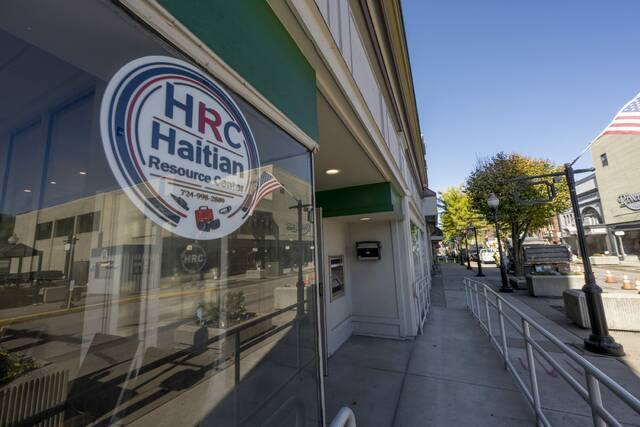https://triblive.com/local/westmoreland/change-of-fortune-charleroi-sees-drop-in-haitians-deportation-fears-job-loss/
Change of fortune: Charleroi sees drop in Haitians; deportation fears, job loss

As Jim Alexandre looks out the window of his Haitian Resource Center office in downtown Charleroi, he wonders how his community will handle its latest challenge — the closure of a food processing plant that will eliminate 250 jobs by the end of October.
“In general, it’s the newest problem,” Alexandre said. “When there is no longer that opportunity, they will look for the next thing. The next thing might be out of town.”
Fourth Street Barbecue Co. provided employment opportunities for a number of Haitians, he said. Those workers who did not have transportation were taken by vans from staffing agencies that supplied the workers to the plants, said Alexandre, who opened his Haitian center in the fall of 2024.
But, now, the Haitians who worked at the plant and have come to the resource center for assistance are uncertain about their future, Alexandre said.
Although he’s not certain how many people from his native country relocated to the Charleroi area in the past few years, he says there are fewer of them now.
That’s an observation shared by Joe Manning, Charleroi borough manager.
There was an influx of Haitian immigrants into the Charleroi area in 2018 and 2019, then more families followed them, according to Leanna Spada, executive director of the Mon Valley Regional Chamber of Commerce.
Once dubbed the “Magic City” of the Mid-Mon Valley because of its bustling business district during its industrial heyday, multiple blows to the community’s economy this year have been “devastating,” Spada said.
Empty storefronts are prevalent today along the borough’s business district on Fallowfield and McKean avenues.
Opportunities lost
Haitians were attracted to the Washington County community along the Monongahela River because it was seen as a welcoming area with job opportunities, Alexandre said. They spread out from Pittsburgh to the Charleroi, Monessen and Donora areas, said Alexandre, who has been in the U.S. for 20 years.
“They desired to be part of what is growing,” Alexandre said, noting grocery stores, restaurants and clothing stores opened along Charleroi’s business district to cater to the immigrant population.
The pending closure of the food processing plant comes on the heels of the April closing of the Corelle Brands factory that made glass bakeware products. About 270 jobs were lost.
A nearby Quality Pasta plant in Charleroi shuttered in August 2024, resulting in the loss of about 100 jobs, Spada said.
And like so many other communities nationwide, Charleroi’s Rite Aid pharmacy on McKean Avenue also has closed.
“We’re trying to help them find other jobs,” Spada said. “Some employers are looking for workers.”
Businesses operated by the immigrant community have helped the economy, said August “Queen” Goll, a Liberian native who owns Queen’s Market on Fallowfield Avenue. She stocks a variety of food catering to the Haitian, Asian and African community in the area.
“This place (Charleroi) provided a platform for all of us — the immigrant community,” Goll said.
Fear, uncertainty
But, Goll said comments from Republican presidential candidate Donald Trump during campaign rallies in September 2024 sparked fear in the Haitian community. Trump claimed Charleroi Area School District’s need to educate Haitian children was costing hundreds of thousands of dollars while the influx of immigrants was leaving the town virtually bankrupt.
Charleroi Area Superintendent Edward Zelich said last September it did add three English Learner Language teachers in the 2024-25 school year and an increase in enrollment resulted in hiring two more full-time kindergarten teachers. The English Learner Language program had about 225 students who were from 26 countries.
Manning, the borough manager, said the influx of Haitians did not make Charleroi “virtually bankrupt.”
Mayor Gregg Doerfler could not be reached for comment.
Goll said federal Immigration and Customs Enforcement agents came to her grocery store earlier this year and confronted two of her workers, questioning whether they were in the country legally and had the right to work.
She sent the requested documentation to the ICE office on Pittsburgh’s South Side, and the concerns over the workers’ immigrant status were resolved, she said.
“We were all scared,” Goll said.
A spokesperson for the ICE office in Pittsburgh could not be reached for comment. ICE did not respond to an email seeking a comment.
Added to the specter of agents from ICE coming to Charleroi on a mission that may lead to their deportation, is the Trump administration’s decision this year to end the Temporary Protected Status extension the Biden administration implemented in 2021. Haitians were eligible to qualify for legal protected status because of political unrest in Haiti, but the Trump administration sought to end the TPS extension in August. A federal judge, however, has extended their protected status for Haitians until February.
The Trump administration said the Temporary Protected Status has been exploited and abused so even Haitians who entered the nation illegally were allowed to qualify for legal protected status.
To those who might say the Haitians should go back to their native land, Cinnamon Brooks of North Charleroi said there is a good reason they would go elsewhere — like Canada — before they would return to Haiti.
“The Haitians are scared to go back because of the violence,” Brooks said.
“We are trying to pivot from this situation,” Alexandre said. “We (Haitians) are not the problem. We want to help the community.
“We want this to be a place where they can be safe.”
Copyright ©2025— Trib Total Media, LLC (TribLIVE.com)
